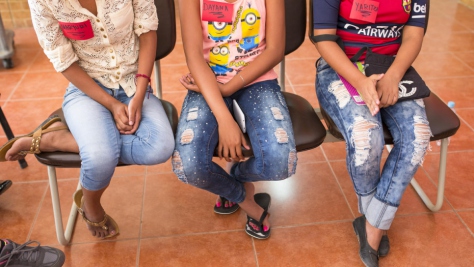UNHCR awards the 2010 Nansen Refugee Award to Alixandra Fazzina
GENEVA, 9 July 2010 - The United Nations High Commissioner for Refugees (UNHCR) today announced the winner of its annual Nansen Refugee Award, British photo-journalist Alixandra Fazzina. Ms. Fazzina was chosen for her tireless dedication to uncovering and portraying the overlooked human consequences of war.
Over the last ten years Alixandra Fazzina has tirelessly documented the plight of the uprooted through distinctive and moving photo reportages. Alixandra Fazzina's work has taken her to Eastern Europe, Africa, the Middle East and Asia to cover human tragedies often neglected by mainstream media.
On winning the Award Alixandra Fazzina said: "I am overwhelmed and absolutely delighted to have been recognized by UNHCR and commended with this distinguished award. Much of my work documents the plight of refugees and the internally displaced and my aim has always been to raise awareness of those forced to flee conflict, violence and misery. To give up one's home and the subsequent struggle to build a new life is one of the hardest challenges anybody can face. Millions every year however have no other choice."
In announcing the Nansen Award, U.N. High Commissioner for Refugees António Guterres said: "Alixandra Fazzina stands out as a fearless humanitarian who achieves something remarkable by unearthing and so vividly portraying individual stories of uprooted people. Her particular talent, her commitment and empathy and her incredible devotion to getting to the bottom of every story makes her an exemplary chronicler of the world's most vulnerable people."
Ms. Fazzina began her career as a photojournalist embedded with the British army in Bosnia. Since then, she has turned her lens from the frontlines to the refugee camps to document the human suffering caused by war. She has been recognized in particular for her coverage of land mine victims in Kosovo, civilians stranded behind enemy lines in Angola, rape as a weapon of war in Sierra Leone, the abuse of children by militias in Congo and Uganda and the refugee situations in Afghanistan and Pakistan.
Ms. Fazzina spent two years in Somalia chronicling the exodus of migrants and refugees from Somalia to the Arabian Peninsula and the smuggling business in the Gulf of Aden. This work resulted in a book, "A Million Shillings, Escape from Somalia", which will be published in September 2010. Risking her life to spend time with people in the squalid shelters along the coast, she captured first hand the despair and suffering of those trying to cross the Gulf of Aden in search of a better life.
The Nansen Refugee Award was created in 1954 in honour of Fridtjof Nansen, Norwegian explorer, scientist and the first U.N. High Commissioner for Refugees. It is given annually to an individual or organisation for outstanding work on behalf of refugees. The Nansen Award consists of a commemorative medal and a US$100,000 monetary prize donated by the governments of Switzerland and Norway. The winner can donate it to a cause of his or her choice.
The Nansen Award Ceremony will take place on 5 October 2010 in Geneva.
-

Protecting persons with diverse sexual orientation and gender identities
15 May 2020 -

Public health response in Rohingya refugee settlements on alert as first coronavirus case confirmed
15 May 2020 -

Honduran family starts new life across the country, but terror is never far
15 May 2020 Hounded by gangs, the family was among hundreds of thousands of internally displaced people on the run within this small Central American nation. -

Central America's displacement crisis aggravated by COVID-19
15 May 2020 -

UNHCR steps up emergency assistance in Libya as continued conflict and COVID-19 create more hardship
15 May 2020 -

UNHCR's approach to age, gender and diversity 2019
14 May 2020 -

UNHCR urges prioritization of mental health support in coronavirus response
14 May 2020 -

Venezuelan counsellors offer fellow refugees 'psychological first aid'
14 May 2020 In Peru, Venezuelan mental health professionals are reaching out to the diaspora with remote sessions to help them cope in the coronavirus pandemic. -

Monika Hernando and Estelle Rodriguez Pardo
13 May 2020
